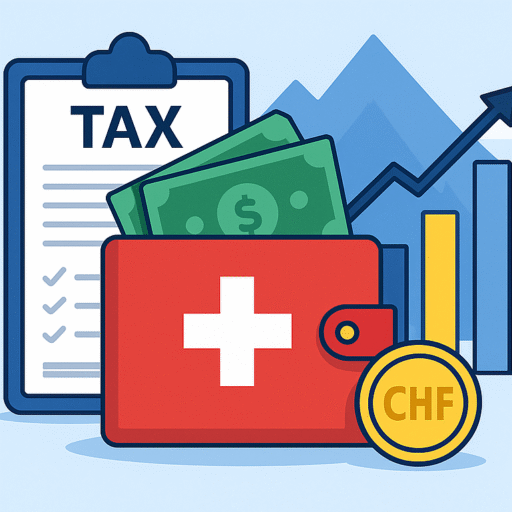Table of Contents
- Why Open a Swiss Bank Account as an Expat or Foreigner?
- Types of Swiss Banks for Foreigners in 2025
- Best Swiss Banks for Foreigners in 2025: A Detailed Comparison
- How to Open a Swiss Bank Account as a Foreigner in 2025
- Required Documents
- Step-by-Step Process
- Tips for a Smooth Application
- Fee Breakdown and Cost Considerations for Non-Residents in 2025
- Critical Updates for 2025
- Frequently Asked Questions (FAQs)
- Final Tips for Expats Choosing a Swiss Bank in 2025
- Conclusion
Finding the best bank in Switzerland for foreigners can be challenging — this guide outlines your top options for 2025.
Switzerland remains one of the most attractive destinations for expats, digital nomads, and international students thanks to its stability, privacy, and world-class banking services. Whether you’re relocating for work, studies, or investment, choosing the right bank is key to managing your finances effectively.
In this guide, you’ll find a detailed comparison of the best Swiss banks for foreigners in 2025 — including fees, available services, and step-by-step instructions on how to open an account as a non-resident or expat.
Why Open a Swiss Bank Account as an Expat or Foreigner?
Switzerland is renowned for its financial stability, privacy laws, and multi-currency banking options. Many foreigners open Swiss bank accounts to benefit from:
- Multi-currency accounts (CHF, EUR, USD, GBP, and more) for seamless international transactions and currency diversification.
- English-speaking customer support and multilingual online banking platforms, making banking accessible for international clients.
- Advanced cybersecurity measures and deposit protection schemes up to CHF 100,000, ensuring your funds are safe.
- Global ATM access with over 300 UBS branches and 800 Raiffeisen locations across Switzerland.
However, non-residents often face higher fees—sometimes up to 30 times more—compared to Swiss residents. Additionally, eligibility criteria can be more stringent, requiring proper documentation and residency proof.
Types of Swiss Banks for Foreigners in 2025
Switzerland offers several types of banking institutions suitable for foreigners, each catering to different needs:
| Type | Best For | Minimum Deposit | Key Features |
|---|---|---|---|
| Traditional Banks | Expats needing comprehensive banking services | CHF 0–500 | Branch network, multi-currency accounts, wealth management |
| Cantonal Banks | Local integration and lower fees | CHF 0–1,000 | Regional focus, community banking, lower fees |
| Neobanks | Digital nomads and non-residents | CHF 0 | 100% online, low fees, crypto support |
| Private Banks | High-net-worth individuals | CHF 500,000+ | Personalized wealth management and investment services |
Traditional Banks (e.g., UBS, Credit Suisse, Raiffeisen, PostFinance)
These banks offer full-service banking, including savings, checking, investment options, and wealth management. They typically have physical branches and multilingual staff, making them suitable for expats who prefer in-person banking.
Cantonal Banks (e.g., Zürcher Kantonalbank, Banque Cantonale Vaudoise)
These banks focus on regional clients, often providing lower fees and stronger community ties. They are ideal for expats who want to establish local banking relationships.
Neobanks/Digital Banks (e.g., Yuh, Neon, Revolut)
Designed for digital nomads and those comfortable with online banking, neobanks offer quick account setup, low or zero fees, and innovative features like crypto support. They are especially popular among younger expats and remote workers.
Private Banks
Targeted at high-net-worth individuals, private banks provide tailored wealth management, investment advisory, and concierge services. The minimum deposit usually starts at CHF 500,000+.
Best Swiss Banks for Foreigners in 2025: A Detailed Comparison
Here’s a detailed comparison of the top banks for foreigners in Switzerland this year, focusing on fees, services, and accessibility:
| Bank | Monthly Fee (Non-Resident) | Minimum Deposit | English Support | Multi-Currency Accounts | ATM Abroad Fee |
|---|---|---|---|---|---|
| UBS | CHF 30 | CHF 0 | Yes | Yes | CHF 5 |
| PostFinance | CHF 25 | CHF 0 | Yes | No | CHF 5 |
| Yuh | Free | CHF 0 | Yes | Yes | CHF 4.90 |
| Neon | CHF 0–15 | CHF 0 | Yes | Yes | 1.0–1.5% (FX) |
| Migros Bank | CHF 30–40 | CHF 0 | Limited | No | CHF 5 |
1. UBS
Best for: Expats requiring comprehensive global banking services with in-person support.
Pros: Over 300 branches, multilingual staff, excellent online banking, and multi-currency accounts.
Cons: Higher non-resident fee of CHF 30/month; FX surcharge of 1.75%.
How to open: Passport, proof of address, income documentation.
2. PostFinance
Best for: Students, budget-conscious expats, and those seeking basic banking services.
Pros: Government-backed, easy online account management, CHF 5 Smart account (waived with CHF 25,000 investment).
Cons: No multi-currency accounts; CHF 25/month fee for non-residents.
How to open: Passport, Swiss address.
3. Yuh
Best for: Digital nomads, crypto enthusiasts, and remote workers.
Pros: No monthly fees, supports crypto, easy online setup, multi-currency accounts.
Cons: No physical branches, ATM fee of CHF 4.90 abroad.
How to open: Valid ID, no Swiss address required.
4. Neon
Best for: Frequent travelers and digital natives.
2025 Tiered Plans:
- Neon Free: CHF 0, with a CHF 2.50 fee per ATM withdrawal in Switzerland.
- Neon Global: CHF 8/month, with three free international ATM withdrawals.
FX Surcharge: 0.35–1.5% depending on plan.
How to open: Online application, ID verification.
5. Migros Bank
Best for: EU-based non-residents and those seeking affordable banking.
Pros: CHF 60/year fee with a CHF 7,500 minimum balance.
Cons: Outdated app, limited English support.
How to open: Passport, proof of address.
How to Open a Swiss Bank Account as a Foreigner in 2025
Opening a bank account in Switzerland as a foreigner involves a clear process, but preparation is key. Here’s what you need to do:
Required Documents
- Passport or national ID (non-EU nationals may need a visa)
- Proof of address (utility bill, rental contract)
- Proof of income (employment contract, tax return)
- Residence permit (for traditional banks)
Step-by-Step Process
- Select the right bank based on your residency status, banking needs, and fee preferences.
- Apply online (for neobanks) or visit a branch in person (for traditional banks).
- Provide certified documents; if your documents are not in English or German, get certified translations.
- Wait approximately 5–10 business days for approval.
- Activate your account and set up online and mobile banking.
Tips for a Smooth Application
- Ensure all documents are up-to-date and correctly certified.
- Some banks may require a Swiss address or local ties, especially for traditional accounts.
- Use a Swiss address if possible to avoid higher non-resident fees.
Fee Breakdown and Cost Considerations for Non-Residents in 2025
| Service | UBS | PostFinance | Yuh | Neon | Migros |
|---|---|---|---|---|---|
| Monthly Fee | CHF 30 | CHF 25 | Free | CHF 0–15 | CHF 30–40 |
| International Transfer | 1.75% + CHF 10 | 1% + CHF 7 | 0.5% + CHF 5 | 0.35–1.5% (FX) | Varies |
| ATM Abroad Fee | CHF 5 | CHF 5 | CHF 4.90 | 1.0–1.5% (FX) | CHF 5 |
| Inactivity Fee | CHF 15/month | CHF 10/month | None | CHF 2.50 per ATM | Varies |
Pro tip: Pair Yuh or Neon with Revolut or Wise to minimize foreign exchange fees and enjoy better rates.
Critical Updates for 2025
- Credit Suisse CSX digital banking service has been discontinued and is no longer available for new customers.
- Neon has introduced new tiered plans, including Neon Global at CHF 8/month and Neon Metal at CHF 15/month, offering more options for digital banking.
- Residency requirements have become stricter; traditional banks now typically require a Swiss address or B/C permits for account opening.
Frequently Asked Questions (FAQs)
Q: Can I open a Swiss bank account remotely?
A: Yes, especially with neobanks like Yuh and Neon. Traditional banks usually require in-person visits and residency proof. Q: Are Swiss banks safe for foreigners?
A: Absolutely. Swiss banks are regulated by FINMA, with deposit protection schemes covering up to CHF 100,000 per depositor. Q: Do Swiss banks report to foreign tax authorities?
A: Yes, under international treaties such as FATCA (for US citizens) and CRS (Common Reporting Standard), banks report account information to tax authorities abroad. Q: What is the best bank for expats in Switzerland?
A: UBS remains the top choice for expats needing comprehensive services and in-person support, while Neon is excellent for digital banking and low fees.
Final Tips for Expats Choosing a Swiss Bank in 2025
- Assess your banking needs: Do you require multi-currency accounts, wealth management, or just basic banking?
- Compare fees carefully: Non-resident fees can be significantly higher; always verify the latest fee schedule.
- Consider digital banks: They offer quick setup, low fees, and innovative features for tech-savvy expats.
- Prepare your documents: Ensure your passport, proof of address, and income proof are certified and up-to-date.
- Check residency requirements: Some banks require a Swiss address or residence permit; others may be more flexible.
Conclusion
Switzerland offers a diverse banking landscape for foreigners, with options ranging from traditional full-service banks to innovative digital platforms. Whether you’re an expat looking for comprehensive support, a digital nomad seeking low fees, or a high-net-worth individual requiring wealth management, Switzerland has a bank tailored to your needs in 2025. Best for expats: UBS (global reach, multilingual support)
Best digital option: Neon Global (CHF 8/month, three free ATM withdrawals)
Budget-friendly choice: PostFinance Smart (CHF 5/month, waived with investments) Always verify the latest fees and account requirements directly with your chosen bank before opening an account. With the right Swiss bank, managing your finances in Switzerland can be straightforward, secure, and tailored to your international lifestyle.

